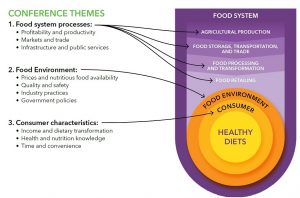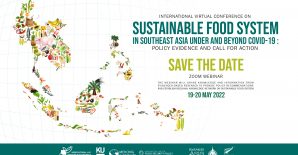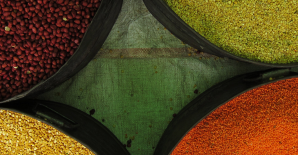Asia is in the midst of a rapid nutrition transition where hunger and undernutrition exist side by side with obesity. Indeed, obesity is rising faster than undernutrition is declining. Addressing the challenge of ensuring equitable distribution of food and access to healthy diets will require integrated strategies to influence all parts of the food system. The Regional Strategic Analysis and Knowledge Support System for Asia (ReSAKSS-Asia) facilitated by the International Food Policy Research Institute (IFPRI), the Myanmar Institute for Integrated Development (MIID) organized an international conference entitled “Evolving Agrifood Systems in Asia: Achieving food and nutrition security by 2030” with the financial support of USAID. The primary objective of the conference was to share knowledge and evidence to guide policymakers and other key actors in designing and implementing effective agrifood system policies to support healthier diets and optimal nutrition.
The conference addressed three integrated themes. Theme 1 focused on food system processes and value chains for nutritious foods including policies that can incentivize and support them such as investment in infrastructure and public services, research and technology development, markets, and public and private partnerships. With food systems transformation and rapid urbanization, new actors and technologies are quickly being introduced into the agrifood system, the existent institutions and governance mechanisms may not meet the concerns of food system actors. Therefore, theme 2 focused on the food environment and the need for institutional and governance innovation in the food system. It also examined country experiences in addressing SDG 2 focusing on policy formulation and implementation, cross sector coordination, and successful program interventions. Theme 3 focused on the consumer by looking at the heterogeneity of dietary transformation across the region and within countries (rural vs urban) and the major drivers of food choices including preferences, affordability, health and nutrition knowledge.

The conference was held at the Hotel Chatrium in Yangon, Myanmar on October 30th and 31st. The agenda below contains links to many of the presentations shared at the event. A conference proceedings document has also been produced. In addition, for those interested, photos of the event can be viewed and accessed via IFPRI's Flickr account.
Download the conference proceedings.
DAY 1
October 30, 2019
8:00 – 8:45 Registration
8:45 – 9:00 Goal and Objectives of Day One
Moderator: Thin Lei Win, Thomson Reuters Foundation
9:00 – 10:15 Opening Session
Welcome remarks
- U Kyaw Swe Linn, Director General, Department of Planning, MOALI, Myanmar
- Teresa McGhie, USAID Mission Director
- Joern Kristensen, Executive Director, Myanmar Institute of Integrated Development
- Paul Dorosh, Director, Development Strategy and Governance Division, IFPRI
Keynote address:
Agrifood Systems for Nutrition—Challenges vs Opportunities
Emorn Udomkesmalee, Senior Advisor, Institute of Nutrition, Mahidol University, Thailand
Q&A and Discussion
10:15 – 11:00 Coffee/Tea Break and group photo
11:00 – 12:15 Plenary Session 1: Food System Dynamics
Chair: Duncan Boughton, Michigan State University
Achieving SDG2 by 2030 through Food Systems Transformations: Implications for Asia
Anaka Aiyar, Post-Doctoral Associate, Cornell University
Nutrition Transition and Food System Transformation in Asian Countries
Olivier Ecker, Senior Research Fellow, IFPRI
Profiling Food Insecurity and Rural Diets in Myanmar
Jose Luis Vivero Pol, Head of Vulnerability Analysis & Mapping Unit, WFP Myanmar
The Cost of Nutrition in Asia
Derek Headey, Senior Research Fellow, IFPRI
Q&A and Discussion
12:15 – 13:45 Lunch
13:45 – 14:45 Panel Session 1: Country Experiences in addressing SDG 2
Panelists
- U Kyaw Swe Linn, Director General, Department of Planning, Ministry of Agriculture, Livestock and Irrigation
- T. Haque, Distinguished Faculty member, Center for Social Development, India
- Hygeia Ceres Catalina Gawe, National Nutrition Council, Philippines
- Sabnam Shivakioti, Joint Secretary, Ministry of Agriculture and Livestock Development, Nepal
Facilitator: Suresh Babu, Senior Research Fellow, IFPRI
Q&A and Discussion
14:45 – 15:15 Coffee/Tea Break and Networking
15:15 – 16:30 Plenary Session 2: Policy Frameworks For addressing SDG 2
Chair: Bart Minten, Senior Research Fellow, IFPRI
Linking Agriculture, Food Systems and Nutrition for Food and Nutrition Security in Myanmar
Khin Mar Cho, International Agricultural Extension and Nutrition Specialist, Cornell University
How the Philippines Aims to Achieve SDG 2
Roehlano Briones, Fellow, Philippine Institute for Development Studies
Transforming Food and Agriculture Systems to Improve Food Security and Nutrition in Sri Lanka
Manoj Thibbotuwawa, Institute of Policy Studies, Sri Lanka
Pakistan’s Multi-Sectoral Nutrition Strategy
Amna Ejaz, IFPRI-Pakistan
Achieving the SDG2 in Timor-Leste
João Boavida, Centre for Peace and Development, Timor Leste and Gianna Bonis-Profumo, PhD. Candidate, Charles Darwin University
16:30 – 17:30 Panel Session 2: Private Sector Experiences with Nutritious value chains
Panelists
- Ritoja Basu, Deputy Director, Food and Agriculture Centre of Excellence, Confederation of Indian Industries
- Toe Nandar Tin, Senior Vice Chair, Myanmar Fishery Federation
- Grahame Dixie, Executive Director, Grow Asia
- Nyantha Maw Lin, Burgundy Hills Company
Facilitator: Mateusz Filipski, Assistant Professor, University of Georgia
Q&A and Discussion
17:30 – 17:45 Closing Remarks
Moderator: Thin Lei Win, Thomson Reuters Foundation
18:00 – 20:00 Reception and Dinner
DAY 2
October 31, 2019
8:00 – 8:45 Registration
8:45 – 9:00 Summary of Day 1 and Goals of Day 2
Moderator: Thin Lei Win, Thomson Reuters Foundation
9:00 – 10:15 Plenary Session 3: Creating an Enabling Enviroment for Improved Diets
Chair: Paul Dorosh, Director, Development Strategy and Governance Division, IFPRI
Impacting at Scale: From .5% to + 40%
Grahame Dixie, Executive Director, Grow Asia
Does e-commerce Increase Food Consumption in Rural Areas? Evidence from China
Xiaobo Zhang, Senior Research Fellow, IFPRI
Traditional Versus Modern Milk Marketing Chains in India: Implications for Smallholder Dairy Farmers
Anjani Kumar, Research Fellow, IFPRI- Delhi
Regulatory Cooperation in ASEAN Good Agricultural Practices
Catherine Frances J. Corpuz, Senior Program Officer, ASEAN-Australia Development Cooperation Program
Q&A and Discussion
10:15 – 10:45 Coffee/Tea Break and Networking
10:45 – 12:00 Parallel Session 1: Nutritious Value Chains
Session 1: Animal-sourced foods
Chair: A. Arunachalam, Indian Council of Agricultural Research
Structural Transformation and the Livestock Revolution in Vietnam: Current Situation and Future Scenarios for the Dairy Sector
Mai-Huong Nguyen, IPSARD
The Quiet Revolution in Myanmar’s Aquaculture Value Chain
Ben Belton, Michigan State University
The Livestock Sector in India: Progress and Challenges
Vijay Sardana, Poultry Federation of India
Production Diversity and Market Access for Predicting Animal-source Food Consumption
Jytoi Felix, Catholic Relief Services
Session 2: Pulses and horticulture
Chair: Aye Aye Khaing, Yezin Agricultural University
Soybean Value Chains for Rural Development
Nimish Jhaveri, Winrock Myanmar
Making Vegetable Markets Work
Ye Htut, Grow Asia, Myanmar
Farm Production, Market Access and Dietary Diversity in China’s Poor Rural Households: Evidence from a Panel Data
Kevin Chen, Senior Research Fellow, IFPRI- Beijing
Findings from the Study on Nutrition-Sensitive Value Chains in the Feed the Future Zone of Influence in Tajikistan
Abduaziz Kasymov, Tajikistan
12:00 – 13:30 Lunch
13:30 – 14:45 Plenary Session 4: Biotechnology Policy
Chair: Phyu Sin Thant, Senior Agronomist, Myanmar Institute for Integrated Development
The Biotechnology Landscape in India
Ravi Srinivas, Research and Information System for Developing Countries (RIS), India
Current Status of Agricultural Biotechnology in Thailand
Orachos Napasintuwong, Department of Agricultural and Resource Economics, Kasetsart University
Creating and Implementing Biosafety Regulations: The Philippine Experience
Carlo G. Custodio Jr., Philippines Country Coordinator, Program for Biosafety Systems
Biosafety Regulation Framework in Vietnam
Dr. Nguyen Kim Chien, Ministry of Agriculture and Rural development, Vietnam
Q&A and Discussion
14:45 – 15:15 Coffee/Tea Break and Networking
15:15 – 16:30 Parallel Session 2: Making Food Safer and More Nutritious
Session 1: Food Safety in Urban Environments
Chair: Joseph Goeb, Michigan State University
Compliance of Producers and Adoption of Consumers in the Case of Food Safety Practices: Cases from South Asia
Devesh Roy, Senior Research Fellow, IFPRI
China’s Food Safety regulatory system: Achievements, Challenges and Suggestions
Prof. Jiehong Zhou, Zhejiang University, China
Institutional and Governance Innovation in Thailand’s Food System: The Role of the Private Sector in Food Safety
Kamphol Pantakua and Natthida Wiwatwicha, TDRI
Session 2: Fortification Policy
Chair: Olivier Ecker, IFPRI
Food Fortification Policies in the Asia Region
Dennis Bittisnich, Food Fortification Initiative
Wheat and Cooking Oil/Ghee Fortification in Pakistan
Amna Ejaz, IFPRI- Pakistan
The History of Cooking Oil Fortification in Indonesia: Government Support for the Program and Challenges
Idrus Jus’at, Senior Lecturer, Esa Unggul University, Indonesia
16:30 – 16:45 Closing Remarks
Shahid Rashid, Director, IFPRI-Asia



